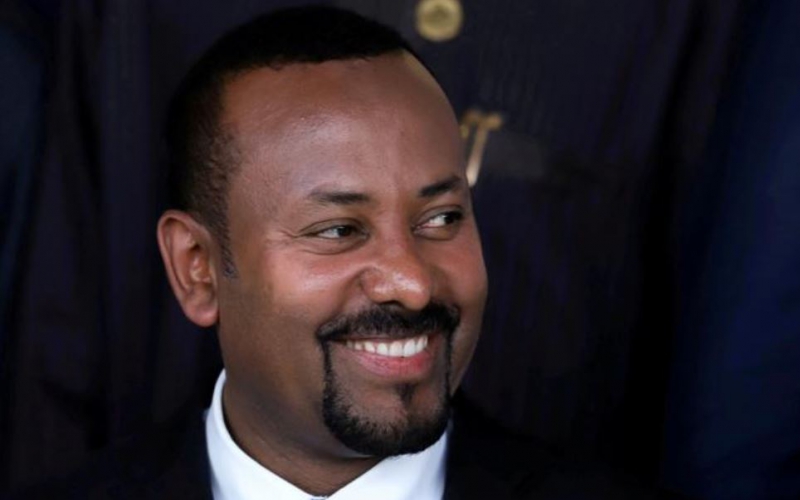 Ethiopia's Prime Minister Abiy Ahmed
Ethiopia's Prime Minister Abiy Ahmed
Dressed in a sharp black suit in front of an illustrious audience, Ethiopia’s Prime Minister Abiy Ahmed strode onto stage at Oslo’s ornate City Hall on December 10, 2019 to accept the Nobel Peace Prize.
“War is the epitome of hell - I know because I have been there and back,” he said, recalling time as a young soldier in a 1998-2000 border war with Eritrea where tens of thousands died in trenches and minefields on scrubland.
Africa’s youngest leader, a fervent Pentecostalist from Ethiopia’s largest ethnic group the Oromo, said that as a radio operator he left his foxhole to seek a better signal only to return minutes later to find his entire unit killed by shells.
“I have seen brothers slaughtering brothers on the battlefield. I have seen older men, women and children trembling in terror under a deadly shower of bullets and artillery shells,” he continued in Oslo after being awarded the prize for brokering peace with Eritrea in 2018.
Now the 44-year-old Abiy is defying international appeals for mediation as he presses an offensive against the rebellious northern region of Tigray.
The conflict pits him against former comrades both in the war against Eritrea and, years later, as partners in government.
Born to a peasant farming family, Abiy’s father was Muslim and his mother Christian.
As a teenager, he joined the armed struggle against the Marxist dictatorship of Mengistu Haile Mariam, who fell in 1991 at the hands of Tigrayan-led rebels. He was a United Nations peacekeeper in Rwanda after the 1994 genocide and rose to the rank of lieutenant colonel in the Ethiopian army.
DEMOCRATIC REFORMS
In the post-Mengistu coalition governments led by the Tigray People’s Liberation Front (TPLF), Abiy had senior posts, heading the science ministry and a cyber security agency.
When protests against state repression swelled, the coalition chose him as prime minister in 2018 to lead reforms.
Stirred by religious fervour, he freed journalists and activists, lifting bans on political parties and prosecuting officials for rights abuses.
He also quickly moved to make peace with old enemy Eritrea.
“Forgiveness frees the consciousness,” Abiy told a huge crowd in Addis Ababa in July 2018, hugging Eritrean leader Isaias Afwerki to celebrate the pact.
Two years on, his pursuit of Tigrayan leaders, accused of attacking a military base and defying his authority, has led to hundreds of deaths, sent refugees fleeing to Sudan, and raised the spectre of a war that could drag in Horn of Africa neighbours.
Diplomats, academics and a government official who spoke with Reuters this week say Abiy’s bold and charismatic personality, plus his religiosity, explain both his early successes as premier and the perilous push against Tigray.
‘MESSIANIC’?
More than a year ago, even as Abiy won the Nobel prize, some observers were warning his brand of leadership risked creating a personality cult.
“The messianic way he looks at things - this makes it difficult to negotiate with him,” said a senior diplomat.
“People saw him as a democrat but, from the outset, this guy has wanted to get control of the political system.”
Abiy’s collision with former Tigrayan allies, which came after the region held an election in September in defiance of federal government orders due to the COVID-19 crisis, showed failures to compromise on both sides, experts said.
Condemnation of the past Tigrayan-led governments’ rights abuses and descriptions of them as “daytime hyenas” infuriated the TPLF.
Despite Abiy’s talk of forgiveness, his government arrested dozens of senior Tigrayan officials on charges of corruption and rights abuses in 2018. Some trials have not started.
“While the TPLF accepted its time of predominance was over, they didn’t accept Abiy’s allegations that they were the only ones responsible for repression and corruption,” said Will Davison, of the International Crisis Group think-tank.
The Tigrayans rebuffed Abiy’s move to form a single party from the four ethnic-based political parties in the ruling coalition. His own Oromo community also chafed at Abiy’s vision of national unity, which some still associate with imperial history and the Mengistu dictatorship.
“Once they (various ethnic groups) saw their dreams of ethnic dominance or political power vanish, they turned on him,” said an Ethiopian official. “He was maybe naive to think his idea of Ethiopian identity would have prevailed over deeply engrained ethnic ones.”
Diplomats say Abiy’s closest advisers are religious leaders.
“He thinks of himself as being on a mission from God ... His narrative is quite dangerous,” said Kjetil Tronvoll, professor of peace and conflict studies at Bjørknes University College in Oslo, noting Abiy’s own reference to himself as a prophet.
“Abiy was always a bit of a chimera, an odd mix of military intelligence meets Pentecostalism, with the latter’s belief that anything is possible given faith and self-belief,” added Alex de Waal, a Tufts University academic.
Redwan Hussein, spokesman of a newly-established State of Emergency Task Force, said the Tigrayans were threatening the very existence of Ethiopia - with Abiy holding the line.
“If he doesn’t salvage Ethiopia, his Nobel won’t mean anything,” he said.




No comments :
Post a Comment